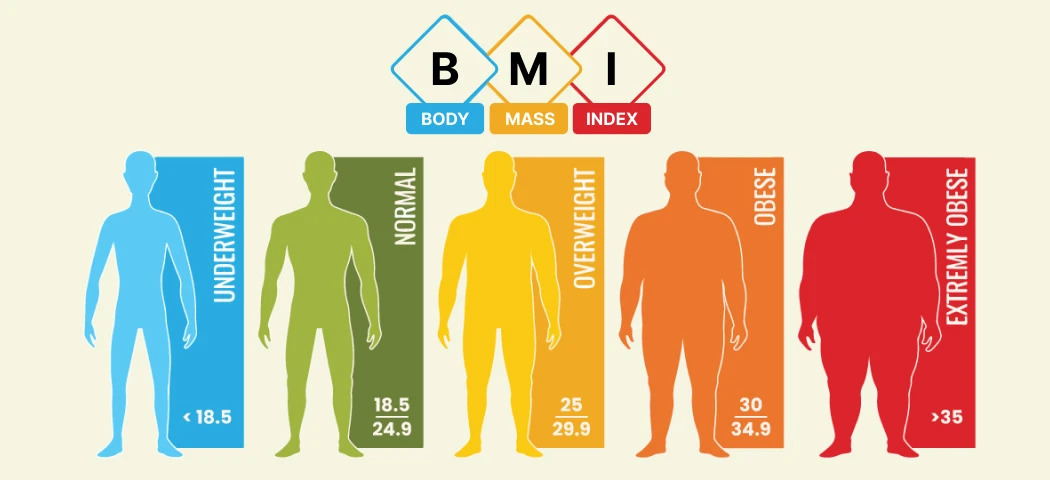In today’s digital age, online tools have become an integral part of our lives, especially when it comes to managing health and wellness. Among these tools, the Body Mass Index (BMI) calculator is widely used to determine whether a person is underweight, normal weight, overweight, or obese. However, how accurate are these online BMI calculators? Understanding their limitations and benefits is crucial, especially when decisions about health insurance and overall well-being are at stake. This article explores the accuracy of online BMI calculators and what you need to know before relying on them.
What is a BMI calculator?
A BMI calculator is an online tool that calculates your Body Mass Index (BMI) based on your height and weight. The formula used is straightforward: BMI = weight (kg) / height (m)^2. The resulting number is then compared to standard BMI categories, which classify you as underweight, normal weight, overweight, or obese.
The simplicity of the BMI calculator makes it a popular choice for individuals seeking a quick assessment of their health. However, while it is a useful starting point, the BMI calculator has its limitations, and its results should be interpreted with caution.
Understanding the limitations of a BMI calculator
One of the primary limitations of a BMI calculator is that it only considers height and weight. It does not take into account other crucial factors such as muscle mass, bone density, distribution of fat, and overall body composition. For instance, athletes or individuals with a high muscle mass may have a higher BMI but are not necessarily overweight or unhealthy. On the other hand, someone with a lower BMI might have a high percentage of body fat, which could still pose health risks.
Moreover, BMI does not differentiate between different types of body fat, such as subcutaneous fat (fat under the skin) and visceral fat (fat around the organs). Visceral fat is particularly harmful and is linked to various health conditions, including heart disease, diabetes, and certain cancers. A BMI calculator does not provide insights into the distribution of fat, which is a critical factor in assessing health risks.
The impact of BMI on health insurance
In India, health insurance companies often consider BMI when determining premiums or eligibility for certain policies. A higher BMI can sometimes lead to higher premiums, as it is associated with an increased risk of health issues such as heart disease, diabetes, and hypertension. However, given the limitations of BMI calculators, this approach can be problematic.
For instance, a person with a high BMI due to muscle mass might be deemed higher risk by a health insurance provider, despite being in excellent health. Conversely, someone with a lower BMI but unhealthy levels of body fat might be undercharged for health insurance, potentially leading to higher costs for the insurer down the line.
Therefore, while BMI can be a useful metric for health insurance purposes, it should not be the sole criterion. Health insurance providers should consider additional factors such as waist circumference, blood pressure, cholesterol levels, and family medical history to get a more accurate picture of an individual’s health.
The role of BMI in personal health management
For individuals, understanding the limitations of a BMI calculator is important in managing their health effectively. While it can provide a general indication of whether you are within a healthy weight range, it should not be the only tool you rely on. Regular health check-ups, including blood tests, body composition analysis, and consultations with healthcare professionals, are essential for a comprehensive assessment of your health.
Additionally, focusing on a holistic approach to health, including a balanced diet, regular exercise, and stress management, is more important than merely aiming for a specific BMI range. Using a BMI calculator should be one part of a broader strategy for maintaining good health.
Improving the accuracy of BMI assessments
To improve the accuracy of BMI assessments, consider using additional tools and metrics alongside the BMI calculator. For example, waist-to-hip ratio (WHR) and waist-to-height ratio (WHtR) are more reliable indicators of fat distribution and cardiovascular risk. These measurements, when used in conjunction with BMI, can provide a more nuanced understanding of your health.
Furthermore, consulting a healthcare professional for a thorough evaluation is always recommended. A doctor can interpret BMI in the context of other health indicators and provide personalised advice based on your overall health and lifestyle.
Choosing the best BMI calculator
If you decide to use an online BMI calculator, choose one that provides additional information or context. Some calculators offer insights into how your BMI compares with others in your age group or provide tips on achieving a healthier BMI. However, be wary of calculators that oversimplify or make claims that seem too good to be true.
The best BMI calculators are those that acknowledge their limitations and encourage users to seek further medical advice. Remember, a BMI calculator is a tool, not a diagnosis.
Conclusion
While the BMI calculator is a convenient and widely used tool, its accuracy and usefulness are limited by its simplicity. Understanding what a BMI calculator can and cannot tell you is crucial for making informed decisions about your health and health insurance. By combining BMI with other health metrics and seeking professional advice, you can gain a more accurate picture of your health and make better decisions regarding your well-being.
In conclusion, don’t rely solely on BMI calculators for your health assessments or health insurance decisions. Use them as part of a broader strategy that includes regular medical check-ups, healthy lifestyle choices, and comprehensive health insurance coverage. By doing so, you can ensure that you are not only within a healthy weight range but also truly healthy in every sense of the word.





